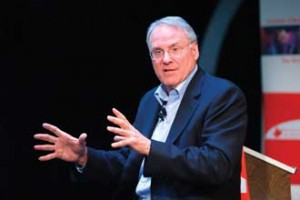
Hockey legend turned legislator shares his vision for a global country in a global age
By Pascal Zamprelli
Ken Dryden was drafted by the Boston Bruins in 1964, and as such could very well have ended up with one of our greatest rivals: Harvard University. Instead, following a trade to the Canadiens, Dryden studied law right here at McGill, and received his degree in 1974.
“It’s always nice to be back,” said the six-time Stanley Cup champion who went on to become a cabinet minister in 2004, and has been elected three times as a Member of Parliament. Dryden was back on his old stomping grounds Monday to face a room packed full of students and deliver a lecture titled “Time for Canada,” this year’s installment of the McGill Institute for the Study Canada’s “the world needs more Canada” series.
Dryden’s primary message was that Canadians need to think about themselves, and their country, very differently. “We are so much more than we are willing to see and accept,” he began.
Indentifying what Canada’s role should be in a fast-changing world, Dryden said, “it depends on whether we see ourselves wrongly as relatively small and powerless, economically, culturally and militarily a backwater far from where the action is, or as the Canada we really are.”
For him, what we really are is a country that has learned to accept, even embrace difference, and learn from it “when in the rest of the world difference often, instinctively, means guns and blood.” We’re a country that’s clean, civil, modest, polite, tolerant and respectful, and “a country where you can plan for tomorrow, when billions around the world cannot.”
But we know this about ourselves, about the stereotypes that we reluctantly admit are true. So what needs to change? That very reluctance, according to Dryden.
We need to embrace those qualities, he said, and do so loudly and proudly, because these are the qualities necessary for the new world order that is upon us. Cynics may call us boring, but if boring means no rampant disease, terrorist attacks, or major economical or political disasters, maybe boring isn’t so bad.
“All those things about us that embarrass us a little,” he said – being civil, modest, polite, tolerant and respectful, getting along, having a history without the glory of revolution or civil war – are now “all those things the world is dying for, all the things a global world needs. The world is connected now, and a connected world cannot be about difference. A connected world can only be about getting along, living together, and the instincts and instruments for doing that.”
In this new world, he said, we can no longer avoid each other. “The biggest challenge of a global world is not economic or environmental or military. It is living together.”
This is a result, Dryden contends, of the shift away from the age of empire, when the world was about power and might, and the strong didn’t have to get along. But in Canada, “we needed each other to survive, and we had to get along, so we did,” he said. “In an age of empire this made us seem weak and irrelevant. But in a post-empire age, power and might are not enough; we all have to get along. As Canadians, we know how.”
In an age of globalism, he said, this makes us not only remarkable, but crucial.
“We are what the world needs – we get along here. We have to be tolerant and decent, fair and generous,” Dryden said. “In a pre-global world, these seemed like “soft” values, the rhetoric of losers. In a global world, these are the essentials.”
“It’s time for a country respectful of others, respectful of difference, and respectful of the future,” he concluded. “It’s time for a country that is where the world is going. It’s time for Canada.”
